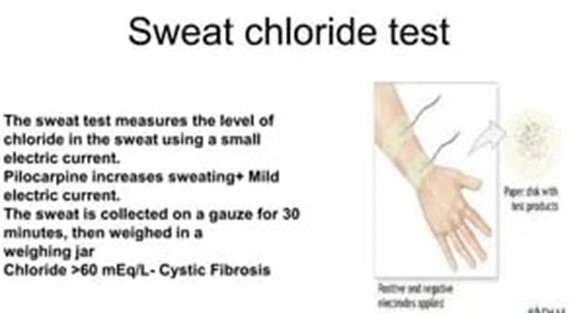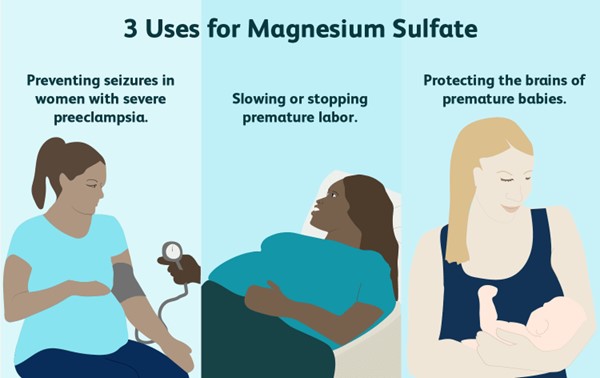Cystic fibrosis (CF) is suspected in a toddler. Which test is essential in establishing this diagnosis?
Bronchoscopy
Serum calcium
Urine creatinine
Sweat chloride test
The Correct Answer is D
This test measures the amount of chloride in the sweat, which is abnormally high in people with cystic fibrosis (CF). CF is an inherited disorder that affects the cells that produce mucus, sweat, and digestive juices.

Choice A is wrong because bronchoscopy is a procedure that allows the doctor to examine the airways and lungs, but it is not essential for diagnosing CF.
Choice B is wrong because serum calcium is a blood test that measures the level of calcium in the blood, which is not related to CF.
Choice C is wrong because urine creatinine is a test that measures the amount of creatinine in the urine, which reflects the kidney function, but it is not relevant to CF.
Normal ranges for sweat chloride test are:
- Less than 40 millimoles per liter (mmol/L) for children and adults
- Less than 30 mmol/L for infants younger than 6 months
A sweat chloride level of more than 60 mmol/L is considered positive for CF.
Nursing Test Bank
Naxlex Comprehensive Predictor Exams
Related Questions
Correct Answer is B
Explanation
The presence or absence of anxiety is a noninvasive assessment that the RN would perform to evaluate the patient’s psychological status and possible signs of hypovolemic shock.
Anxiety can indicate reduced cerebral perfusion due to blood loss and low blood pressure.
Choice A is wrong because pulse oximetry is a noninvasive assessment that the RN would perform to measure the oxygen saturation of the patient’s blood, not the circulatory status.
Choice B is wrong because heart sounds are a noninvasive assessment that the RN would perform to auscultate the cardiac rhythm and rate of the patient, not the circulatory status.
Choice C is wrong because arterial pulses are a noninvasive assessment that the RN would perform to palpate the strength and quality of the patient’s peripheral pulses, not the circulatory status.
Choice D is wrong because skin color, temperature, and turgor are noninvasive assessments that the RN would perform to observe the skin integrity and hydration of the patient, not the circulatory status.
Normal ranges for pulse oximetry are 95% to 100%, for heart rate, are 60 to 100 beats per minute, and for blood pressure are 120/80 mmHg.
Correct Answer is C
Explanation
Magnesium sulfate is given to women with preeclampsia and eclampsia to prevent and treat convulsions.

Magnesium sulfate is a mineral that reduces seizure risks in women with preeclampsia. A healthcare provider will give the medication intravenously. Sometimes, it’s also used to prolong pregnancy for up to two days. This allows drugs that speed up your baby’s lung development to be administered.
Choice A is wrong because magnesium sulfate does not improve patellar reflexes or increase respiratory efficiency. In fact, it may cause decreased or absent deep tendon reflexes and respiratory depression as side effects.
Choice B is wrong because magnesium sulfate does not shorten the duration of labor. It may actually prolong labor by inhibiting uterine contractions.
Choice D is wrong because magnesium sulfate does not prevent a boggy uterus or lessen the lochial flow. It has no effect on uterine tone or bleeding after delivery.
Whether you are a student looking to ace your exams or a practicing nurse seeking to enhance your expertise , our nursing education contents will empower you with the confidence and competence to make a difference in the lives of patients and become a respected leader in the healthcare field.
Visit Naxlex, invest in your future and unlock endless possibilities with our unparalleled nursing education contents today
Report Wrong Answer on the Current Question
Do you disagree with the answer? If yes, what is your expected answer? Explain.
Kindly be descriptive with the issue you are facing.
